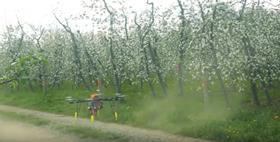
A New York tech company are claiming the world’s first pollination by drone after successfully fertilizing a 300 acre orchard.
The Beak & Skiff Apple Orchard in Lafayette, Florida, teamed up with US start-up Dropcopter, who have been developing a pollen distributing drone since 2015, according to Digital Trends. The bots can cover 40 acres per hour, and unlike bees, work round the clock by pollinating at night.
CTO of Dropcopter Adam Fine said: “We have a patent-pending device which accurately distributes a measured amount of pollen directly over the tree canopy. The drone flies an autonomous prewritten mission optimizing its speed to deliver the most effective application. We are the first real-world testing of automated aerial pollination in the nation.”
His company secured £250,000 investment in April this year from local tech firm Genius NY accelerator.
Robotic pollination has been touted as a response to global declining bee populations, with many blaming the insecticide group neonicicotinoids for their demise. Harvard University have been working on a “robobee”, similar in size to the insect, and can now land and take off from water.
Other pollination alternatives include large scale spray operations which lack the coverage or speed to pollinate large areas of crops.
Fine added: “One-third of all food products rely on insect pollination. Over the past 25 years, the world has lost one-third of its insect biomass, which is a scary figure since 80 percent of all species on Earth are insects. At the same time, rising populations and changing climates mean we’re going to have less arable land and fresh water to feed the 9 billion people that will be on this planet in the next 50 years. We are going to have to farm far more efficiently with far fewer resources to meet the 60 percent increase in crop production necessary to feed those 9 billion people.”



